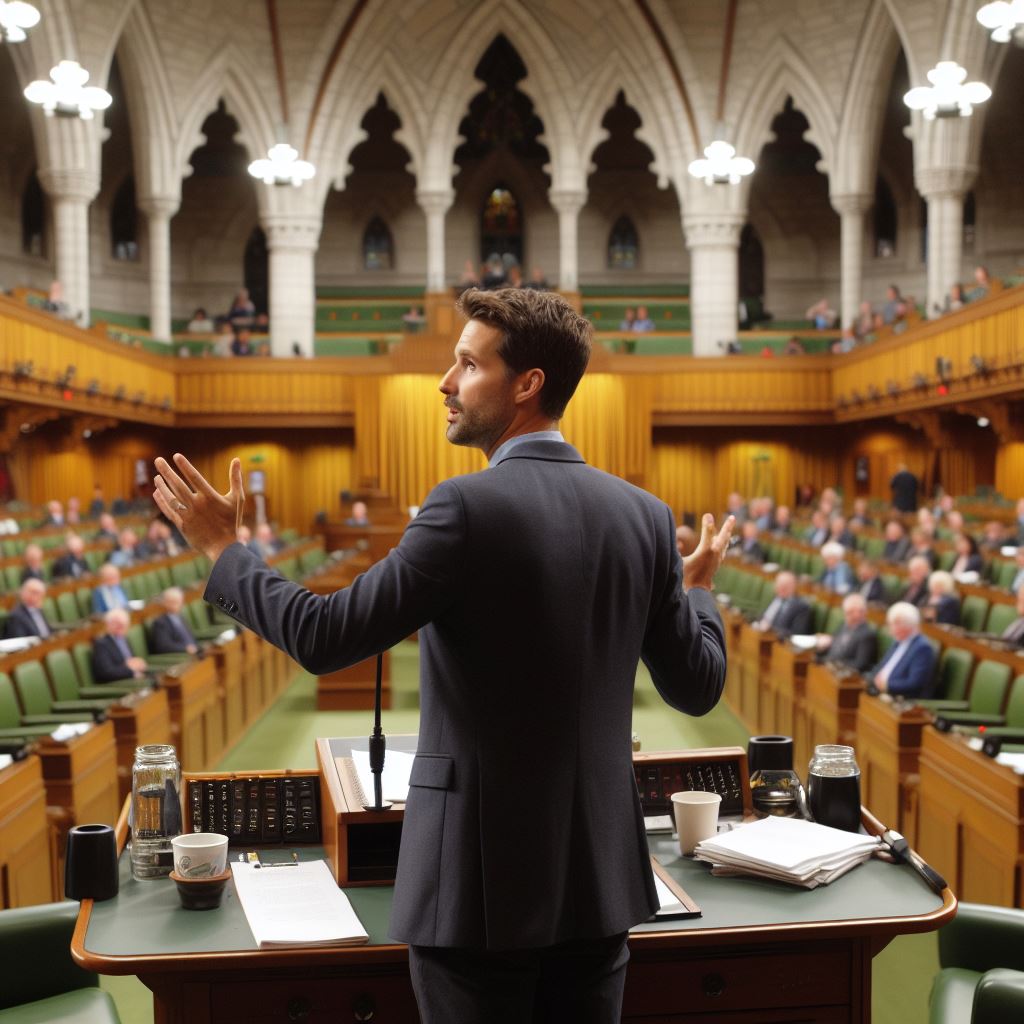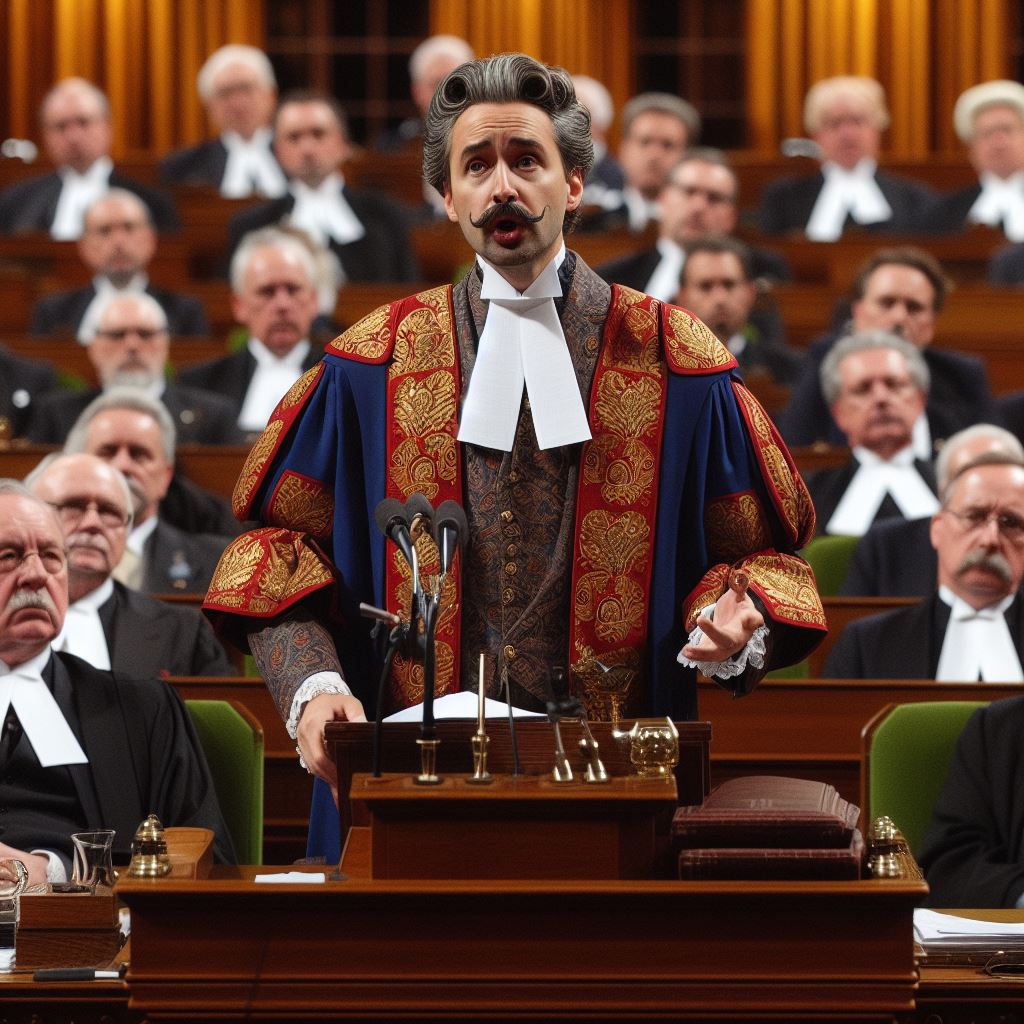Introduction
Canada relies on politicians to shape policies and make crucial decisions that impact the country’s future.
The paths to becoming a politician in Canada vary but are essential in driving progress.
Against the backdrop of Canada’s political tapestry, the journey towards becoming a politician unfolds in a tapestry of possibilities.
From the bustling halls of academia, where aspiring leaders hone their intellectual prowess, to the grassroots level, where community engagement lays the foundation for public trust, each route is unique.
The corridors of political parties beckon, presenting opportunities for ambitious minds to align with ideologies and work their way up the ranks.
Simultaneously, the realm of advocacy and activism acts as a crucible, shaping advocates into formidable voices for change.
Navigating this labyrinth requires not only a keen understanding of policy intricacies but also the ability to connect with the diverse mosaic of Canadian society.
Networking events, town hall meetings, and social media platforms become platforms for discourse, enabling aspirants to articulate their visions and build coalitions of support.
Furthermore, the journey is not without its challenges. The rigorous demands of public service demand resilience, and political landscapes are often shaped by unforeseen twists.
Yet, it is within these challenges that future politicians forge their mettle, learning to adapt, negotiate, and champion the interests of their constituents.
In essence, the paths to becoming a politician in Canada are as diverse as the nation itself.
This exploration will unravel the tapestry, shedding light on the myriad experiences that converge to shape leaders, each with a unique imprint on the Canadian political landscape.
Overview of the Canadian Political System
The structure of the Canadian political system
In Canada, the political system is structured at three levels: federal, provincial, and municipal.
Federal Level
- The federal level is responsible for making decisions and governing the entire country.
- At this level, the government is divided into three branches: the executive, legislative, and judicial branches.
- The Prime Minister, along with Members of Parliament, holds power at the federal level.
- They are responsible for creating and passing laws, addressing national issues, and representing the country internationally.
Provincial Level
- Provinces in Canada have their own separate governments with a Premier as the head.
- Provincial politicians are responsible for creating laws and governing their respective provinces.
- They handle areas such as education, healthcare, transportation, and natural resources.
- Each province has its own legislative assembly, similar to the federal parliament, where laws are debated and passed.
Municipal Level
- At the municipal level, cities and towns have their own local governments.
- Municipal politicians, like mayors and city council members, are elected to represent their communities.
- They are responsible for local governance, managing local services, and making decisions for their municipalities.
- These decisions include zoning regulations, community development projects, and public infrastructure.
Politicians at all levels have various roles and responsibilities in the Canadian political system.
Roles and Responsibilities
- Federal politicians play a significant role in setting national policies, managing the economy, and representing Canada internationally.
- They also oversee important institutions such as the military, healthcare system, and educational framework.
- Provincial politicians are responsible for implementing federal policies within their provinces.
- They control areas such as education, healthcare systems, and transportation networks.
- Municipal politicians focus on local issues and decision-making that directly affect their communities.
- They collaborate with provincial and federal levels to ensure the effective management of resources and services.
Becoming a politician in Canada is a rigorous process that requires dedication and perseverance.
Individuals interested in pursuing a political career can start by joining a political party or an advocacy group.
Getting involved in community activities, volunteering, and networking are crucial steps towards building a strong political profile.
Many politicians in Canada have experience working in other fields before entering politics.
It is important to develop expertise and knowledge in areas of interest or expertise before seeking public office.
Once ready, aspiring politicians can run for office at various levels.
This process usually involves campaigning, connecting with constituents, and sharing their platform.
Ultimately, voters have the final say in electing politicians to represent them at the federal, provincial, and municipal levels.
By participating in the democratic process, Canadians contribute to shaping the future of their country.
Becoming a politician in Canada is an opportunity to serve the public, make a difference, and be a voice for the community.
While the path to becoming a politician may be challenging, it is a rewarding journey for those committed to public service.
Unlock Your Career Potential
Visualize a clear path to success with our tailored Career Consulting service. Personalized insights in just 1-3 days.
Get StartedRead: A Day in the Life of a Canadian Politician
Education and Qualifications
The educational background needed to become a politician in Canada
Educational background is a crucial factor in the path to becoming a politician in Canada.
A strong academic foundation is highly valued and can greatly increase one’s chances of success in the political arena.
The importance of a strong academic foundation
One of the most important educational qualifications for aspiring politicians is a bachelor’s degree in political science or a related field.
A degree in political science provides a comprehensive understanding of government structures, policies, and processes, which are essential knowledge for politicians.
In addition to a degree in political science, there are other related fields of study that can be beneficial for aspiring politicians.
These include degrees in international relations, law, economics, public policy, or history.
These fields provide complementary knowledge and skills that can enhance one’s ability to navigate the complexities of the political landscape.
While a bachelor’s degree is the minimum requirement, many successful politicians in Canada pursue advanced degrees to further improve their qualifications.
Master’s degrees or even Ph.D.s in fields relevant to politics can provide a deeper understanding of policy-making and allow for more specialized knowledge in specific areas of interest.
Additional qualifications or certifications that may be beneficial
Aside from formal education, politicians in Canada can also benefit from additional qualifications and certifications.
For example, completing courses or obtaining certifications in public speaking, conflict resolution, or negotiation can be valuable skills for effectively engaging with constituents, stakeholders, and other political actors.
Moreover, obtaining a law degree and becoming a lawyer can also be advantageous, as it enhances one’s knowledge of the legal system and provides the ability to analyze and draft legislation.
It is worth noting that while education and qualifications play a significant role in becoming a politician in Canada, they are not the sole determinants of success in this field.
Practical experience, strong communication skills, and a genuine commitment to public service are equally important.
In short, a strong educational background is essential for anyone aspiring to become a politician in Canada.
A bachelor’s degree in political science or a related field provides a solid foundation, while additional qualifications and certifications can further enhance one’s qualifications.
However, it is important to remember that education alone is not enough, and practical skills and a passion for public service are equally crucial in the pursuit of a political career.
Read: Navigating Government Policies: Analyst Tips
Political Experience
When it comes to aspiring politicians in Canada, gaining political experience is a crucial step towards success.
Without a solid foundation in the political realm, it becomes challenging to navigate the complex world of politics.
Here, we will discuss the significance of gaining political experience, the avenues available for acquiring it, and the benefits of networking within the political sphere.
The significance of gaining political experience for aspiring politicians
Political experience is the backbone of a successful political career.
It provides the necessary knowledge, skills, and insights needed to understand the intricacies of the political landscape.
By actively participating in political activities, aspiring politicians gain a deeper understanding of the democratic process, policy-making, and public service.
Moreover, political experience enhances credibility and demonstrates a commitment to public service.
It allows aspiring politicians to establish a track record of their dedication to improving their communities and advocating for the issues that matter to them.
The different avenues for gaining experience
There are various avenues available for individuals seeking political experience in Canada:
- Joining Political Parties: Joining a political party, whether at the local, provincial, or federal level, offers invaluable opportunities for aspiring politicians. It provides access to party conventions, grassroots campaigning, and networking with established politicians.
- Student Governments: Participating in student governments, such as student council or university-wide associations, can develop valuable leadership and organizational skills. It allows aspiring politicians to engage in political discourse and gain practical experience in decision-making.
- Community Organizations: Involvement in community organizations, such as non-profits, advocacy groups, or volunteer initiatives, exposes aspiring politicians to various community issues and helps build strong connections with community leaders.
The benefits of networking and building connections within the political sphere
Networking and building connections within the political sphere are essential for aspiring politicians. Here’s why:
- Opportunity for Mentorship: Networking with experienced politicians provides opportunities for mentorship, allowing aspiring politicians to learn from those who have successfully navigated the political landscape.
- Access to Resources: Building connections provides access to crucial resources such as fundraising networks, campaign support, and valuable advice from seasoned political operatives.
- Increased Visibility: Networking helps aspiring politicians establish their presence within political circles and gain visibility among potential voters and party insiders.
- Collaborative Opportunities: Building connections fosters collaboration with like-minded individuals, enabling aspiring politicians to form alliances, support each other’s campaigns, and jointly advocate for their shared interests.
In fact, gaining political experience is vital for aspiring politicians in Canada.
It equips them with the necessary skills, knowledge, and credibility to navigate the complex world of politics.
Joining political parties, engaging in student governments, and participating in community organizations are excellent avenues for gaining experience.
Additionally, networking and building connections within the political sphere offer vital opportunities for mentorship, access to resources, increased visibility, and collaborative partnerships.
By actively pursuing political experience, aspiring politicians position themselves for future success and meaningful contributions to their communities.
Read: Politician Salaries: A Canadian Overview
Party Involvement
The role of political parties in Canadian politics
Political parties play a crucial role in Canadian politics, shaping the democratic process and governance.
The importance of joining a political party and actively participating in its activities
Joining a political party and actively participating in its activities is highly important for individuals aspiring to become politicians.
How party involvement can provide opportunities for aspiring politicians to gain visibility and support
Party involvement provides aspiring politicians with numerous opportunities to gain visibility and support.
Networking
- Joining a political party allows individuals to network with party members, officials, and established politicians.
- These connections help aspiring politicians build relationships that can be beneficial in their political career.
- Mentorship and guidance from experienced politicians can be invaluable in navigating the political landscape.
Learning the Ropes
- By actively participating in party activities, aspiring politicians can learn about the intricacies of the political process.
- They gain insight into policy development, campaign strategies, and fundraising techniques.
- Being actively involved in the party helps individuals familiarize themselves with the party’s ideology and goals.
Developing Skills
- Party involvement allows aspiring politicians to develop essential skills required for political roles.
- By engaging in public speaking, organizing events, and leading campaigns, they hone their communication and leadership abilities.
- Working within a party also fosters teamwork, negotiation, and consensus-building skills.
Platform for Visibility
- Active participation in party activities helps aspiring politicians gain visibility within the party and beyond.
- They can leverage their involvement to showcase their capabilities and dedication, making them attractive candidates for higher positions.
- Through party involvement, aspirants can demonstrate their commitment to public service and political causes.
Access to Support
- Being part of a political party provides aspiring politicians with a support system.
- Party members and officials can provide guidance, resources, and endorsements.
- Support from within the party can significantly boost an individual’s chances of securing a nomination or winning an election.
Platform for Advocacy
- Party involvement offers aspiring politicians a platform to advocate for specific causes and policies.
- They can actively contribute to policy discussions, shaping the party’s agenda and influencing decision-making.
- By leveraging their party affiliation, they can advocate for issues important to their constituents.
Joining a political party and actively participating in its activities is vital for aspiring politicians in Canada.
Party involvement provides networking opportunities, skill development, visibility, and access to support.
Furthermore, being actively involved in a party allows aspirants to contribute to policy discussions and advocate for important issues.
Overall, party involvement serves as a stepping stone towards a successful political career in the Canadian context.
Read: Ethics in Policy Analysis: A Critical Look

Networking and Relationship Building
The power of networking and building relationships in the political landscape
In the world of politics, who you know can be just as important as what you know.
Building a strong and diverse network of contacts can open doors and provide invaluable support on your journey to becoming a politician in Canada.
Networking allows you to form connections and establish relationships with influential individuals who can vouch for your credibility and help advance your political career.
It is a critical skill that can significantly impact your success as a politician.
The importance of attending political events, conferences, and fundraisers to connect with influential individuals
Attending political events, conferences, and fundraisers is key to expanding your network within the political community.
These gatherings provide a platform to interact with like-minded individuals and gain exposure to influential figures in the field.
By actively participating in such events, you create opportunities for meaningful conversations and deepen your understanding of the political landscape.
You also get a chance to showcase your expertise and passion for the issues that matter to you, leaving a lasting impression on those you meet.
Tips on how to effectively network and foster relationships within the political community
Networking successfully entails more than just attending events and collecting business cards.
Here are some effective strategies for forging connections and fostering relationships in the political community:
- Be proactive: Take the initiative and introduce yourself to others. Don’t wait for people to approach you.
- Be genuine: Show a sincere interest in others and their work. Engage in meaningful conversations and actively listen.
- Follow up: After meeting someone, send a personalized follow-up email or thank-you note to maintain the connection.
- Utilize social media: Connect with political influencers and organizations on platforms like Twitter and LinkedIn to stay updated and engage in conversations.
- Join political organizations: Participating in political organizations and associations provides opportunities to meet individuals with similar goals and interests.
- Offer assistance: Make yourself valuable by offering your skills or assistance to others within the political community.
- Attend community meetings: Attending local community meetings can help you connect with constituents and build a strong base of support for your political endeavors.
- Volunteer: Engaging in volunteer work for political campaigns or causes allows you to form relationships with people who are passionate about similar issues.
- Be patient: Building strong relationships takes time, so be patient and persistent in your networking efforts.
- Maintain connections: Once you establish relationships, nurture them by staying in touch, providing updates, and offering assistance whenever possible.
In general, networking and relationship building play a vital role in a politician’s journey in Canada.
Actively participating in political events, conferences, and fundraisers, and utilizing effective networking strategies can help you connect with influential individuals, gain support, and advance your political career.
Remember to be proactive, genuine, and patient in your networking efforts, as strong relationships are crucial in the competitive political landscape.
Campaigning and Elections
The process of running for office in Canada
Running for office in Canada involves several steps, starting with choosing a political party to represent.
- Prospective candidates must then gain their party’s nomination through a local nomination meeting.
- Once nominated, candidates can officially register with Elections Canada and become official candidates.
- The election campaign period in Canada typically lasts for about 36 to 50 days.
- Candidates engage in various activities during their campaign, such as door-to-door canvassing, attending public events, and giving speeches.
- They also create campaign platforms that outline their policy proposals and goals.
- Political debates and forums provide opportunities for candidates to engage in discussions and showcase their expertise.
- During the campaign, candidates rely on campaign teams and volunteers to support their efforts.
- Financial resources are vital, and candidates must diligently fundraise to cover campaign expenses.
- Elections take place at different levels in Canada, including local, provincial/territorial, and federal.
The different levels of elections
Local elections
Local elections in Canada refer to elections for municipal governments, which include cities, towns, and rural areas.
Candidates running for local office typically campaign door-to-door, attend community events, and participate in local debates.
Local elections often focus on issues directly affecting the community, such as infrastructure, public services, and local development.
Winning a local election is an essential step for politicians looking to gain experience and build their political career.
Provincial/Territorial Elections
Provincial/territorial elections occur in Canada’s 10 provinces and 3 territories.
Candidates running for provincial or territorial office must align themselves with a specific political party.
These elections often involve more substantial campaign efforts, including media appearances, rallies, and larger-scale fundraising.
Policy debates during provincial/territorial elections revolve around matters such as healthcare, education, and regional issues.
Winning a seat in a provincial or territorial legislature provides an opportunity to influence regional policies and advocate for constituents.
Federal Elections
Federal elections in Canada determine which political party will form the national government.
Candidates running for federal office can represent a political party or run as independent candidates.
The federal campaign period tends to be more intense, lasting up to several months.
Candidates participate in national debates, conduct nationwide speaking tours, and heavily utilize media campaigns.
Policy discussions during federal elections revolve around national issues, such as the economy, healthcare, immigration, and foreign affairs.
Successful candidates in federal elections become Members of Parliament, representing their respective constituencies in the House of Commons.
In a nutshell, running for office in Canada involves a multi-step process that begins with joining a political party and gaining party nomination.
The campaign period is a crucial time for candidates to engage with the public and promote their policies.
Elections take place at various levels, including local, provincial/territorial, and federal, with each requiring different campaign strategies.
Campaigning and participating in elections are vital components of the path to becoming a politician in Canada.
Challenges and Ethical Considerations
The challenges aspiring politicians may face, such as fierce competition and negative public perception
Fierce competition and negative public perception are common challenges faced by aspiring politicians in Canada.
The importance of maintaining ethical conduct throughout the political journey
Maintaining ethical conduct is crucial throughout the political journey to build trust and credibility.
Avoiding corruption, conflicts of interest, and unethical practices is essential for a successful career in politics.
Strategies for handling challenges and maintaining integrity in the political sphere
One strategy for handling challenges is to stay focused on one’s goals and maintain a positive image through transparency.
Aspiring politicians should be prepared to face scrutiny and criticism from the public and the media.
Building a strong network of supporters and mentors can help navigate the challenges of a political career.
Developing effective communication skills and being well-informed on political issues can help counter negative public perception.
Integrity and honesty should be at the core of decision-making processes and policy development.
Politicians should resist the temptation to use their positions for personal gain or the benefit of special interest groups.
Adhering to a strict code of conduct and ethical principles can help politicians maintain their integrity.
Engaging in continuous self-reflection and self-improvement can help politicians stay grounded and committed to ethical practices.
Seeking advice from respected mentors and experts in the field can provide valuable guidance for maintaining ethical conduct.
Establishing strong relationships with constituents and actively listening to their concerns can help politicians fulfill their ethical obligations.
Public officials must always put the interests of the public above their own personal or political interests.
Regularly revisiting and reassessing one’s ethical standards can help politicians stay accountable and avoid ethical pitfalls.
Being transparent about campaign financing, donations, and potential conflicts of interest is key to maintaining ethical conduct.
Politicians should be willing to make difficult decisions based on what is ethically right, even if it is not politically advantageous
Engaging in open dialogue and promoting diversity of opinions can help politicians make more informed and ethically sound decisions.
Striving for a more inclusive and fair political system can help address the ethical considerations associated with politics.
Supporting legislation and policies that promote transparency, accountability, and ethical behavior can help improve the political sphere.
By prioritizing ethics and overcoming challenges, aspiring politicians can contribute to a healthier and more trusted political environment in Canada.
Conclusion
Becoming a politician in Canada requires dedication, commitment, and a strong passion for public service.
We have explored various paths, including education, volunteering, and community involvement.
It is important to consider the different routes available and choose the one that aligns with your goals and values.
Whether it is through party involvement, running in elections, or working in government, each path offers unique experiences and opportunities.
Remember, success in politics is not solely based on political affiliations, but also on the ability to connect with constituents and make a positive impact.
So, if you aspire to become a politician in Canada, seize the chances and put your passion into action.
Your commitment and dedication can pave the way for a rewarding and impactful political career.




